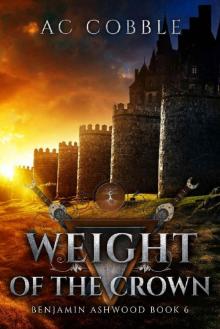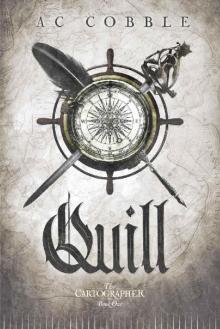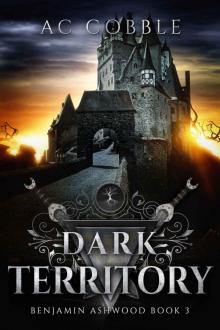- Home
- A. C. Cobble
Sacrifice Page 2
Sacrifice Read online
Page 2
“You said Northundon was attacked,” remarked Oliver. “Was it Finavia… no, the Coldlands? What of mother?”
“Yes,” confirmed Edward, turning to his youngest. “It was raiders from the Coldlands. Evidently, more of them than we’ve ever seen. One hundred longboats, if the report is accurate. The only word we’ve had about the fate of the city came from the remnants of the fishing fleet, fled to Glanhow.”
“The only word,” murmured Oliver, his eyes falling as realization struck him.
“We sail tomorrow, son,” he said, his eyes fixed on Oliver. The boy had just been named the Duke of Northundon after seeing his thirteenth winter, though the prince knew that was far from his son’s thoughts. Lilibet had insisted a regent oversee the province while Oliver continued his studies in Southundon. She’d claimed he was too young for the responsibility of rule. She’d certainly declare he was too young to go to war. But, they had not been given a choice. Oliver had been spared the attack on Northundon, but he would not be spared this. When duty called, a Wellesley answered.
Oliver looked up.
Edward saw the knowledge in his son’s eyes. Even at thirteen winters, Oliver knew what it meant that there had been no word from Northundon. He knew what one hundred Coldlands longboats could do if they landed near the sparsely defended city. The knowledge was in his eyes, but not acceptance. In time, Oliver would learn. Edward would talk to the boy on the journey north, try to prepare him for what they were to find. Later, on the airship, when they had time.
“Be ready at dawn, son.”
2
The Prophet I
“Thrust!” Thotham cried.
Samantha lunged, striking the hanging strawman square in the gut. The figure spun on the rope, dancing away from her blow.
“Again!” he barked.
She struck again and again. Battering the swinging and twisting strawman, aiming her blows at its center, tracking its movement with her eyes.
Then, the blunt tip of her wooden practice blade sank into the target. As it spun away from her, she lost her grip on the weapon and it was ripped from her from hand. She darted after it, grasping for the hilt of the sword, but the strawman reached the end of its swing and then came back, bouncing off the girl and sending her stumbling out of the way. She cursed, words he certainly had not taught her, and she made to jump back and yank her weapon from the target.
“Hold,” he instructed.
Samantha paused, pushing her jet-black hair from her face, eyeing him.
“You were overeager, Samantha,” he advised. “You’re letting your anger show. In a real fight, that will get you killed.”
“I’ve fought before, Thotham, and no one has killed me yet,” she muttered. “Anger can give you strength.”
“That is true. No one has killed you — yet,” he agreed, rolling his eyes. He instructed her, “Run one lap around the farm. As you run, think about what you train for. Our war is not with little boys and girls fighting over a scrap of hard bread. This is nothing like what you know. Anger will kill you, girl, if you let it.”
She grunted, shaking her head at him, but she started running, trotting out of the open barn doors and down the weed-fringed path that led to the fence line around the property. Along that fence line, a narrow dirt track was worn into the earth where for two years she had been running. At first, he’d run with her. Now, he needed the break. Not from training, but from the willful girl.
Thotham sighed, wondering if her grunt had been due to his command to run or if it was his insistence on calling their plot of land a farm. It hadn’t been such in over a decade, he suspected, but once a farm always a farm, as far as he was concerned.
Thotham watched the girl as she rounded the first corner, her pace quick and steady. After two years of training, one lap would barely get her heart beating faster, and she was only twelve winters. Soon, if he wanted a way to wear her out, he’d need to find a bigger farm.
The current one was ten hectares, previously bequeathed to the Church. He’d obtained it as Church leadership had no interest in land which yielded no income, and no one joined the priesthood for the opportunity to plant and hoe.
Years ago, he’d claimed the plot and no one had spoken a word about it since. It didn’t mean they forgot, though. The Church kept its secrets, but it never forgot. He thought about that as he saw a cassocked man appear at the end of the road.
The newly arrived priest watched Thotham’s apprentice as she jogged along the fence at the far end of the fallow field. The man studied her curiously and then turned. He spotted Thotham emerging from the barn and walked briskly closer, the running girl evidently passing from his mind.
She kept running, as if she hadn’t seen the newcomer, but her mentor knew that she had. Thotham knew that as soon as he entered the farmhouse with the priest, the girl would come running to hide outside of a loose window or a poorly fitted joint. Eavesdropping was a nasty habit Samantha had picked up before she began her study under him. Frustrating, when she listened in on his private conversations, but her attitude was one of the reasons he’d selected her.
Burning curiosity, small respect for authority, and a sharp enough mind that she could get away with her transgressions — most of the time. He snorted, thinking of the creche he’d pulled the girl from. The priestesses there thought they’d tamed Samantha. They didn’t know nine tenths of what the girl was up to underneath of their noses. A sharp mind, yes, and potential. Potential that was rare. If only he could keep her out of serious trouble long enough. Long enough to accomplish what he’d set out to do. He brushed the thought aside and walked into the farmhouse yard to meet the approaching priest.
“Inside?” he asked as the man drew close.
The priest smirked and glanced around the empty, untended fields. “Worried about someone overhearing us?”
“No,” replied Thotham, studying his visitor. “I just know you priests from Westundon rarely make it out into the country. I imagined you could use a rest.”
“A rest and an ale,” replied the priest, rubbing his protruding belly.
Thotham nodded and turned, leading the man into the small farmhouse. One open room, two bedrooms. It wasn’t much, but it was more than enough for his purposes.
“The girl has her own room?” wondered the priest, studying the simply furnished place. Proper humble quarters for a priest.
“Of course,” Thotham replied, moving to the cupboard to collect empty mugs. He pulled the tap on the small ale barrel he kept and waited while the man thought that over.
“Why is she here, then, if not…”
Thotham grunted, handing the priest a frothy mug of ale. “The young can serve a purpose in this world outside of the bedchamber.”
“They can?” asked the priest with a wink. “You’re a strange man, Thotham. I’ve heard that all of your kind are,” he remarked, sipping the ale. He winced. “This is not very good.”
“I brew it myself,” explained Thotham. “All of us priests have our peculiarities, don’t we?”
The visiting priest set his mug down.
“Why are you here?” wondered Thotham.
“Coldlands raiders attacked Northundon,” replied the priest without preamble.
“Sorcery was involved?”
“The only reports are from the scattered remnants of the fishing fleet that escaped to Glanhow. It appears that the longboats cut right through them on the way to Northundon. There’s been no word out of the city itself.”
“Not even across the glae worm filament?” inquired Thotham.
“Nothing,” confirmed the priest.
“Sorcery then,” surmised Thotham. He glanced to the window where he suspected his apprentice was hiding, listening to the conversation. “Why?”
His guest could only shrug.
“It makes no sense,” insisted Thotham. “Do they think to conquer all of Enhover? If not, surely they expect a bloody reprisal. It cannot lead to anything but open war. Tens of thousands m
ay die, for what? Even with their dark magic, they must know Enhover can best them in the field? We have twenty times the soldiers that they do, not to mention the new technology the prince has been developing.”
“For what indeed?” murmured the priest. “The intention of a sorcerer is never straightforward. We all know the dark path is a winding one. It matters little, though, does it? The attack happened and we can only offer a hope to the spirits that anyone survived. The Church must respond.”
“The Council of Seven is aware?” asked Thotham.
“They are,” agreed the priest. “They contacted me through the waking dream. I am attuned, I suppose you could say. It is my role in the Church to listen to the whispers and relate our superior’s instructions. They asked me to inform you that Westundon’s two airships will sail at dawn. They’ll rendezvous with the fleet out of Southundon on the way north.”
“And they want me on one of those ships?”
The priest merely shrugged. “I was given no instructions other than sharing this information.”
Thotham closed his eyes and sipped his ale, trying to make some sense of the puzzle. What did the Coldlands gain from the attack?
“You are a Knife, then?” wondered the priest. “I’ve never actually met one of your kind, but I’ve heard the stories. Stories told by others who have also never met one of you…”
Thotham opened his eyes and glanced at the man. “Maybe they have met us but did not realize it.”
“Maybe. There’s not many of you left, is there,” said the priest, tilting his head. “Could be even fewer if the Coldlands sorcerers came in force.”
“True,” agreed Thotham. “There are not many of us left.”
The priest sat, watching him. Finally, Thotham suggested, “If you are not going to drink the rest of the ale, then it’s time to leave.”
“What should I tell the council?”
“Tell them you spoke to me,” answered Thotham. “They’ll know the rest.”
The priest stood, shaking out his cassock, then nodded to Thotham. He walked to the door and opened it, peering outside. “The girl, would you like me to care for her while you’re gone? I can offer her comfortable quarters back in Westundon. She’ll be waiting for you if you return.”
“Don’t worry about the girl,” said Thotham. “I am certain this conflict will not be the end of either of us. We have much to do before our time on this side of the wheel is over.”
Muttering under his breath, the priest slammed the door. Out the open window, Thotham heard his footfalls as the priest stomped down the farm path.
“Come in, Samantha,” Thotham said aloud. “We have to pack.”
3
The Sergeant
“Where are you from, Sergeant?”
“Northundon, m’lord,” he responded.
The commander winced. “Sorry. I… I am sorry.”
They sat silently for a moment, both of them leaning on the wooden gunwale of the airship. The cold winds high above the Sheetsand Mountains knifed through their woolen longcoats, chilling them to the bone. Fitting, he supposed, given what they’d set out to do.
The nobleman adjusted his wig, tugging it down as if it would warm him in the frosty air. A foolish thing to be wearing on campaign, thought Sergeant Patrick McCready, but he supposed the nobleman thought he had to keep up appearances. As if anyone cared. As if anyone had a thought for anything other than what lay ahead of them.
Their commander was not a man of the people, but unlike his older brother, he was trying. McCready supposed he should give the man credit for that. Duke William Wellesley made the rounds, made small talk with the men, and stood outside in the bitter chill with them for little purpose other than to be seen. I didn’t quite improve morale, but it didn’t hurt, either.
At a loss for what to say to the peer, the sergeant finally offered, “The men are glad that you and your brother chose to lead this campaign, m’lord.”
“You had… have family in Northundon?” asked the commander.
“Most of us that volunteered did— do have, I mean,” murmured the sergeant. “My parents, my sister, her husband and the children. Friends, too.”
“I am sorry, Sergeant.”
“Do you have family there as well, Duke Wellesley?”
“I do,” confirmed the peer. “My brother’s wife, others…”
“Your brother’s wife?” McCready stammered. “Princess Lilibet, I-I didn’t know.”
“It’s no secret, but my brother hasn’t spoken of it much,” replied William. “She’s from there, you know? She visited Northundon regularly. That the spirits put her there when this happened…” The commander’s fist curled tight and he smacked it down on the wooden railing. “She was like a sister to me.”
“I understand,” breathed the sergeant. “We will get them, m’lord. The men are behind you and the prince. The bastards will pay for what they’ve done.”
“They will,” agreed the peer. After a moment, he asked, “What’s your name, Sergeant?”
“Patrick McCready, m’lord.”
“Call me William, Patrick,” requested the duke.
“We’ll get the bastards, William.”
Duke William Wellesley nodded and stood upright, his longcoat flapping free in the wind. “Don’t stay out in the cold too long, Sergeant. Two more turns of the clock and we have to be ready for action. Think about ducking below deck and warming up. We’ll need every man for what’s coming.”
“I’ll be ready, m’lord.”
Without further word, their battalion commander, Duke William Wellesley, turned and headed across the deck to the captain’s cabin. He’d draw up battle plans, confer with his lieutenants, or maybe just get warm as he’d suggested. Patrick McCready, though, kept his eyes fixed ahead.
Ahead, where they could see the haze of smoke on the horizon. Black smoke, thousands of yards in the air, visible from fifty leagues away. That much smoke could only be from one place. One city. One city that was burning.
He held the taper against the wick and the fuse crackled and sparked as it flared alight.
“Fire on,” he called. “Drop.”
One of his squad members pushed the small keg and it rolled down a pace long ramp, the wick flashing in and out of sight as it turned. Then it passed the gunwale and dropped over the edge of the airship down into the smoke below.
“Munition on,” called another squad member.
He held the taper against another fuse, waiting until it sparked a light and then calling, “Fire on. Drop.”
A flash of light lit the smoke underneath of them and a moment later he heard a concussive whomp. The first munition had detonated. The blast rocked the airship and he swayed in time with the motion, already practiced at keeping his feet during a bombing run.
“Munition on,” called his squad member as the second keg exploded below them.
“Fire on. Drop.” He felt the deck rock underneath his feet again as the second blast tore the air beneath their vessel. “Sanderford, go tell the first mate to bring us up a bit, will you?”
“I’m right here, sergeant,” snapped the grizzled old seaman. “You worry about the bombs, and I’ll worry about our elevation.”
Sergeant McCready snorted. “You don’t know any more about these damned airships than I do, First Mate. What happens if the bombs shake up the keel, man? The bottom of this vessel could be falling apart from these blasts and we wouldn’t even know it.”
“Doesn’t matter much, does it?” growled the first mate. “Not like we’re going to start taking on water.”
McCready grunted. He pointed through the gloom at a rising stone spire that passed a hundred yards starboard. “What if we run into one of these towers?”
The first mate studied the ruined stone structure. It’s windows, once filled with brilliant stained glass, we’re shattered empty recesses. Its pale white limestone was blackened from the fires and smoke that had raged at its feet.
Despite
their persistent bombing campaign, none of the damage was done by them. Swallowing uncomfortably, McCready looked away as he saw movement within those vacant windows.
“We’ve got the sweeps out, Sergeant,” offered the first mate. “We’ll steer clear of the towers. Away from the Church and the palace, there aren’t many of them. I know the lay of this place like the back of my hand. Don’t you worry, I’m not any more interested in crashing into a tower than you are.”
“You’re from Northundon?” wondered McCready.
The first mate nodded grimly.
“I as well,” said the sergeant.
“Commander Wellesley’s the one who ordered us so low,” admitted the first mate, his tone softening. He crossed his arms and looked over the munitions teams that were busy shoving barrels packed with a red saltpetre gunpowder mixture over the sides. “The commander wants us low where we can see what we’re bombing. Visibility is… well, you can see that yourself, Sergeant. If we sail much higher all we’ll see below is smoke.”
“That’s all I’m seeing now,” grumbled McCready. He gestured over the gunwale at the ruined city below them. “Smoke, rubble, and shadows.”
Crumbled buildings had been ransacked and burnt from the attack by the Coldlands raiders. Then, they’d been pounded by Enhover’s own munitions. Some structures still retained a semblance of their former shape and purpose, but McCready guessed half of them were nothing more than piles of broken rock. It seemed leadership was content to continue the bombing runs until the second half of the buildings joined the first in ruin.
For two days, they’d been floating above the city and dropping explosives into it. After the first few hours, when they’d caught the bulk of the Coldlands raiders near the harbor attempting to flee, it was silent below them. Silent except for the thumps in the smoke as the other airships dropped their bombs. Silent and dead — but that didn’t mean it was still.
Below them in the gloom they could see shadows lurking amongst the ruins. Shadows that were cast by no light that they could see. Shades, they were. Shades that had been summoned by the Coldlands sorcerers and remained after their masters were killed by Enhoverian bombs. The shadows relentlessly stalked the ruins through day and night. The bombs did nothing to them. Nothing did. There was no way for mundane weapons to kill something that was already dead.

 Weight of the Crown
Weight of the Crown Quill
Quill The Cartographer Complete Series
The Cartographer Complete Series Benjamin Ashwood Box Set 2
Benjamin Ashwood Box Set 2 Empty Horizon
Empty Horizon Endless Flight
Endless Flight Sacrifice
Sacrifice Dark Territory
Dark Territory